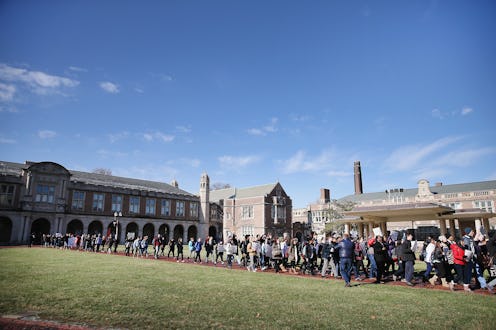News
Second Debate Tickets Are Hard To Come By
As the candidates prepare for the second presidential debate, viewers are preparing how best to watch the certain-to-be epic showdown. The debate will be held on Sunday, Oct. 9 at 9 p.m. ET at Washington University in St. Louis, Missouri. The university is no stranger to the chaos; it has played host to four other debates, including the 2008 vice presidential debate between Sarah Palin and Joe Biden. But unless you are a card-carrying student of Washington University, scoring a ticket to the debate isn't a likely possibility.
The Commission on Presidential Debates decides how to allocate tickets to the event. Because this is a town-hall style event, the audience poses the questions to the candidates. The crowd will be made up of undecided voters selected by the Gallup Organization. However, any remaining tickets allocated to the university are only made available to current WashU students. To make odds worse, they are doled out via a lottery system. But don't fret — the debate will air on many major networks and on their respective online streaming channels. So, you'll still be able to watch the face-off from the comfort of your couch.
The town-hall style debate is always of particular interest, because the candidates lose the security blanket of a podium, and are forced to interact directly with the voters. CNN's Anderson Cooper and ABC's Martha Raddatz, two seasoned and esteemed political journalists, will take the helm as moderators at this debate. The format, however, is more casual because audience members will be asking some of the questions. In turn, the moderators' role will be to guide the debate and make sure it doesn't devolve into an incomprehensible interrupt-fest, like Tuesday's vice presidential debate between Tim Kaine and Mike Pence.
Even if you're not in the audience, you still have the chance to get your question asked. In a new effort this year, the Commission on Presidential Debates agreed to allow people to post questions on a website run the bi-partisan group the Open Debate Coalition. People can then vote on those questions, and the moderators have agreed to consider the 30 questions with the most votes.
Hillary Clinton needs to build on the success she had in the first debate and keep the momentum in her favor. She has been criticized in the past for not being relatable, so the town-hall format is her best chance to show the American people she can be both relaxed and personable. She clearly knows her stuff policy-wise. Though policy should matter most in this election, some people apparently think that things such as drinking partner compatibility are pretty important.
Donald Trump needs to stay on task and recover from his debate flop last week. The town-hall format suits his larger-than-life personality. But it may also be his weakness. Cooper and Raddatz aren't going to let him get away with any half-baked policy answers. If he gets wrapped up in pandering to the audience and doesn't focus on coherent answers, he could fall into the same traps Clinton laid for him in the first debate.
If the record 80 million viewers of the first debate was any indication, 2016 is a standout year for politics — for better or worse. The candidates know they'll be under the microscope when they take the stage in Missouri on Sunday night, so be sure to tune in and maybe even submit a question or two.
